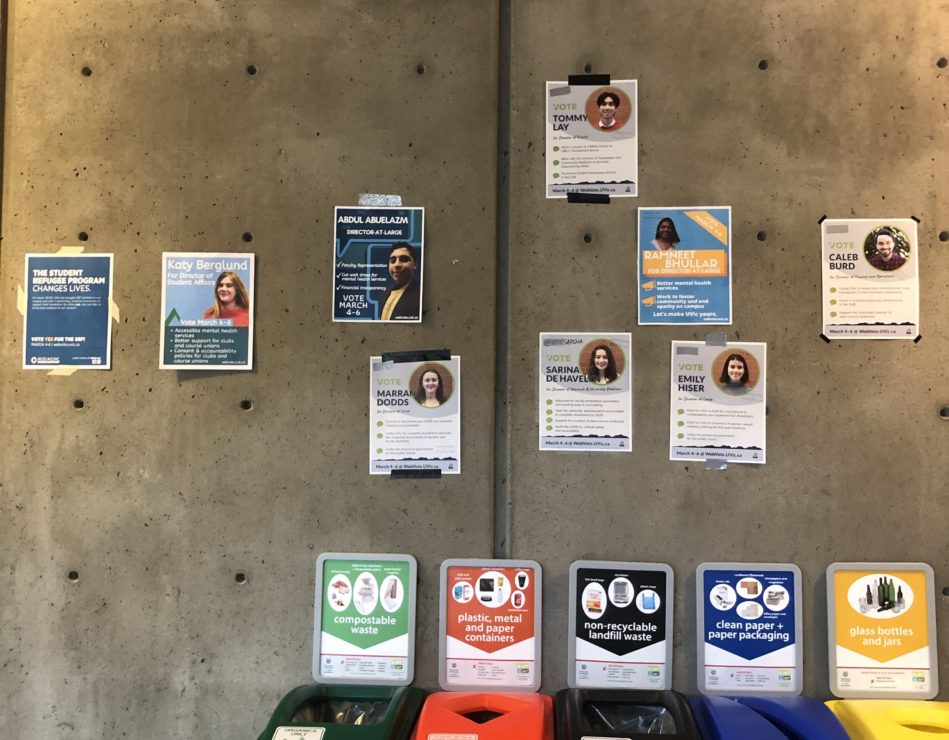From petting zoos to two-ply paper, we’ve seen enough empty promises

We are about to enter the quietest UVSS election campaign yet. With on-campus chalking, in-person campaigning, slates, and cooperatives all banned during this year’s election, how will UVSS director-hopefuls attract the attention of the fickle student vote?
We’re the only newspaper that regularly reports on what’s happening at the UVSS. Our advice to this year’s UVSS hopefuls: don’t promise petting zoos. Listen to the voices of the students who are going through rough times. Advocate for the marginalized on issues where you have a chance of making a difference, and provide support for advocacy groups that already exist on campus. Fund programs that are already doing good work instead of doing pet projects.
Working within the jurisdiction of the UVSS doesn’t necessarily mean thinking small. While we’re not here to dismiss the value of high-quality toilet paper, students face greater issues than the SUB’s one-ply paper. Students also face mounting pressure from mental health challenges and the difficulties of online classes. UVSS advocacy should focus on these issues, and pay less attention to areas beyond their jurisdiction.
So, what should UVSS hopefuls be thinking about as they prepare to deliver their Zoom classroom talks?
There’s still room for advocacy in a UVSS platform. Critically, UVSS candidates must not forget the union part of ‘student union’ — the UVSS is supposed to advocate on student’s behalf of students and do so effectively. It’s not enough to make nice promises about lofty and unachievable goals.
Instead, we advise student candidates to research how they can use their positions to pressure the university administration and government partners to actually change.The efforts of Divest UVic, which became a UVSS campaign in 2019, have shown that student advocacy is critically important — and that it works. Student advocacy on housing bylaws has been effective in the past, and there remains a need for continued effort on this front. Both of these efforts have a common thread: they had a groundswell of support from students. These two campaigns are examples of the instances where by listening to students’ concerns, the UVSS has been able to mobilize student support for actual changes.
Student unions can be more than just gift-card giving, survey-sending organizations. One just has to look to the courageous work of student unions in Thailand (2020), Hong Kong (2019), and Quebec (2011) to see what student unions could be capable of.
For that to happen, we need students with ambition, grit, and leadership skills to take the helm — not political science majors looking to pad their resumes. The process of selecting the representatives of the 20 000 or so UVic undergrads usually goes like this: a group of ambitious, dedicated friends (mostly political science majors) get together and dream up big ideas for the campus. No taxes on textbooks! A Green New Deal! Live music in Vertigo! Petting zoos on campus!
The aspiring student politicians then campaign together in (now-abolished) slates and begin an often vicious and partisan campaign period against another group of ambitious folks, possibly also mainly composed of political science kids, with a near-identical mandate. During the campaign period, chalk and poster turf wars took over the exterior of the SUB and the David Turpin Building. Inevitably, complaints to the electoral office are filed. The Martlet, CFUV, and the Elections Office host a spicy debate for budding politicians to unleash their argument skills and make allegations about the authenticity of their opponents’ commitments to activism.
In the end, with votes from a small fraction of the student population, one group prevails. But the newly elected directors quickly find out that their power to enact change from their desks is severely limited. Platform promises often focus on lobbying other bodies like UVic and governments, because focusing on organizations that have greater power can lead to shinier — but not necessarily realistic — promises. The fact remains that you cannot simply lobby a government body to do something that isn’t in their interest. Going back to the Divest movement, it truly takes a groundswell of student support and years of political pressure.
Last time we checked, we were still paying taxes on our textbooks. We are also still paying UVic’s athletic fee. Both of these unfulfilled promises signal a trend we’ve noticed in the past few years — board candidates liken to popular catchy slogans that they have no actual advocacy path to enact. In this way, we’ve seen candidates essentially exploit the lack of knowledge students have about their student union and thereafter leave students feeling disenfranchised by not following through.
Emphasizing grand promises misses the fact that student unions can play a significant role in the lives of their students by focusing on ground-level initiatives. The UVSS houses and funds a number of organizations that make a critical difference in the lives of their members. While advocating for UVic to create better mental services is valuable, UVSS-funded supports like the Peer Support Centre help students navigate mental health challenges on a daily basis. Focusing on improving and bringing more students into these service providers is one of the most important things a student union can do.
Organizations like the Students of Colour Collective, Native Students Union, and Society for Students with a Disability run events, provide resources, and advocate for marginalized students on campus. Consulting with and bolstering the efforts of these organizations is a concrete way that the UVSS can make a difference in the lives of their constituents.
So, dear UVSS hopefuls, please don’t promise students a petting zoo. We don’t need a petting zoo. We need you to expand the existing valuable services in the SUB, advocate for issues you can realistically impact, and listen to students’ concerns.
And if you get elected, act as a student union, and stand up for students.







